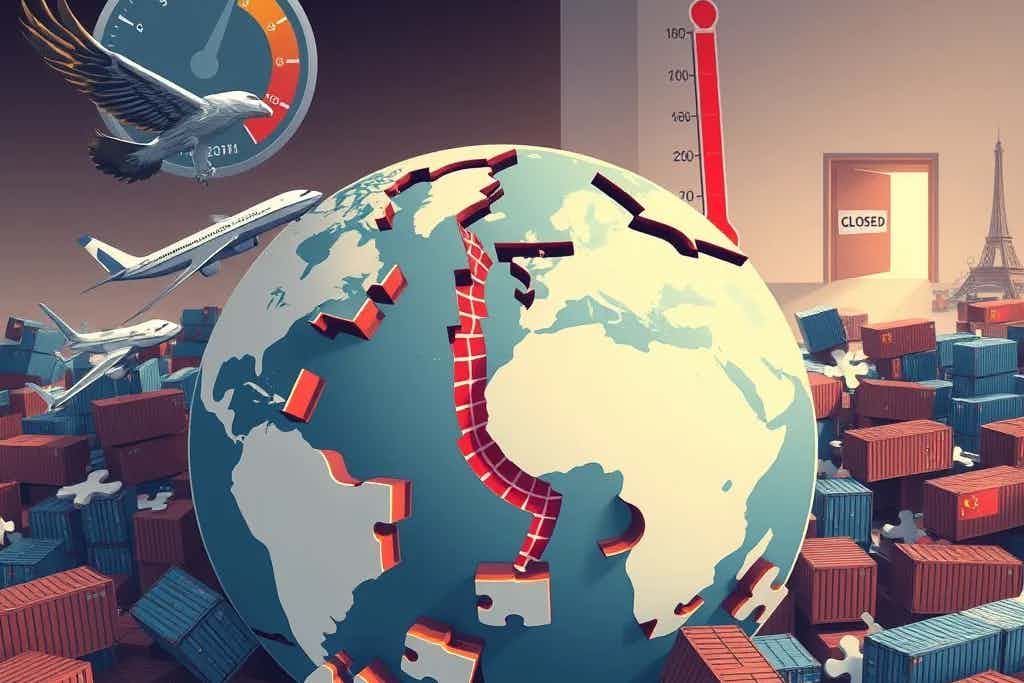You ever notice how stuff’s been getting more expensive lately? Groceries, electronics, even shipping takes longer than it used to. It’s not just bad luck or inflation doing its thing. A big part of it? Geopolitics.
I know, I know—geopolitics sounds like one of those things you hear on the news and immediately tune out. But here’s the thing: when countries start butting heads, the ripple effects mess with the whole global system. And that system? It’s the same one that gets your favorite cereal on the shelf or that phone part shipped across three continents before landing at your door.
It’s All One Big Jenga Tower
Let’s paint the picture. Imagine the global supply chain like an insanely tall Jenga tower. Each block? A country, a factory, a shipping lane, a tiny component. Now, imagine someone knocks out just one block in the middle—maybe a country slaps on new tariffs, or two governments stop talking, or worse, start fighting. Suddenly the whole thing gets wobbly.
And guess what? That wobble is what turns into a higher bill at the grocery store or that annoying “delivery delayed” email.
A Few Global Spats That Made Everyone's Life Harder
Let’s break down a few recent hits from the world stage that made us all pay the price—literally.
🇨🇳 The U.S. and China: Trading Blows
This one’s been going back and forth like a bad breakup. Tariffs here, bans there, supply chain reroutes everywhere. Companies scrambled to find new suppliers, and that cost? Yeah, it lands right in your checkout cart.
🇬🇧 Brexit: Paperwork Overload
Remember when the UK left the EU? A whole mess of new trade rules came into play overnight. Delays, labor gaps, extra costs—you name it. Cross-border trade basically went from “smooth sailing” to “pulling teeth.”
🇷🇺 Russia and Ukraine: The Energy Domino Effect
This one hit like a sledgehammer. Gas pipelines, wheat exports, airspace shutdowns… the works. Europe’s energy bills skyrocketed, grain prices soared, and a ton of shipping routes got rerouted. Not exactly a quiet ripple—more like a tidal wave.
So, What Does This All Mean for You?
You might be thinking, “Cool history lesson, but how does this actually affect me?”
Here’s how:
When one piece of the puzzle breaks, companies have to pay more to get that piece somewhere else. That cost trickles down—straight into your wallet.
When products get scarce, prices jump. It’s good ol’ supply and demand doing its thing.
When fuel and freight cost more, everything that moves (which is, well, everything) gets pricier.
Oh, and if one country’s currency crashes thanks to some political chaos? Imports get more expensive for everyone else. It’s all connected.
Inflation’s Not Just Numbers—It’s a Real Thing
We’ve all felt it. That weird moment when you realize the same basket of groceries you used to buy now costs way more than it did last year. This isn’t just some “market trend” economists debate over lattes—it’s real. In 2022, the U.S. hit its highest inflation rate in 40 years. The EU wasn’t far behind, especially when energy bills started looking like rent payments.
And no, supply chain issues aren’t the only reason. But they’re a big, messy, unavoidable part of it.
So, Are We Just Stuck With This?
Not entirely. People are trying things.
Some companies are bringing production closer to home—or at least not relying on one country for everything.
Others are stockpiling parts they know might get caught up in future drama.
Tech is helping too—stuff like AI predictions and blockchain tracking is giving companies a bit more heads-up when the next disruption starts brewing.
Governments are tweaking policies, raising interest rates, trying to cool inflation without freezing the economy. It’s a tightrope walk, honestly.
What’s Next?
If we’ve learned anything, it’s this: the global economy is way more sensitive than we thought. A war over there? Your gas prices go up. A trade fight across the ocean? Your package is delayed. A diplomatic cold shoulder? That ingredient your local bakery relies on just got five times more expensive.
The world’s complicated. And as long as countries keep arguing, poking, and pushing, those arguments will keep echoing into everyday life—one grocery run or shipping delay at a time.
So next time you hear about some border dispute or economic sanctions, don’t just scroll past. That headline might just be the reason your coffee costs a dollar more next week.










